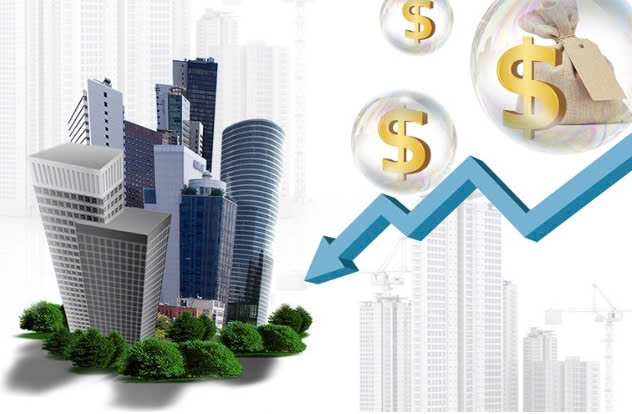As the global economy continues to face various disruptions, inflation and interest rates have become two critical factors directly affecting the real estate market. For Vietnam in particular, fluctuations in prices and financial policies have posed numerous challenges for investors, homebuyers, and real estate businesses.

1. Inflation and Rising Housing Prices
In 2024, global inflation remains high. In Vietnam, the Consumer Price Index (CPI) is forecasted to increase by an average of 4.5% compared to the previous year. This has significantly impacted the cost of construction and real estate project development. The prices of raw materials such as steel, cement, and wood have consistently risen, forcing developers to adjust product prices to protect their profit margins. According to estimates from the Vietnam Association of Realtors, the average selling price of apartments in major cities like Hanoi and Ho Chi Minh City increased by 10% to 15% in the first half of 2024.
A specific example can be seen in Ho Chi Minh City, in the districts of 9 and Thu Duc, which are hot spots for apartment and townhouse development. Here, the price of apartments rose from VND 60 million per square meter to nearly VND 70 million per square meter within just one year. This not only puts pressure on homebuyers but also makes it difficult for investors to maintain profits from short-term transactions.
2. Rising Interest Rates – A Burden for Homebuyers
In parallel with inflation, rising bank interest rates are another key factor affecting the real estate market. To control inflation, the State Bank of Vietnam has raised the base interest rate to 6.5%, higher than the 4% rate in 2023. This has directly impacted the ability of consumers to borrow for home purchases.
According to statistics from the State Bank, total real estate credit debt by June 2024 had decreased by about 12% compared to the same period in 2023, indicating a significant decline in mortgage activity. With average mortgage interest rates ranging from 10% to 12% per year, many homebuyers have had to think carefully before deciding to invest, leading to a slowdown in the mid- and high-end apartment markets.
A Savills study in the second quarter of 2024 showed that the number of apartment transactions decreased significantly, especially in the mid-range housing segment. In Hanoi, the number of successful apartment transactions decreased by 18% compared to the first quarter, with the primary reason being the increased cost of borrowing. Not only were homebuyers affected, but investors using financial leverage also faced higher financial costs, leading to more cautious investment decisions.

3. Investors Shifting Focus
Faced with rising interest rates and inflation, many investors have had to adjust their investment strategies. Instead of focusing on high-end housing projects or apartments in city centers, investors are gradually shifting towards real estate products with long-term profit potential, such as industrial real estate and land plots in suburban areas.
According to a report from DKRA Vietnam, in 2024, land transactions in suburban areas such as Binh Duong, Long An, and Dong Nai surged, with average prices increasing by 20% to 25% compared to the same period last year. Investors expect that with the rapid industrialization and urbanization trends in these regions, real estate values here will continue to rise in the long term, despite short-term challenges from inflation and interest rates.
4. Long-Term Impact on the Market
Looking to the future, the combination of high inflation and interest rates could continue to cause undesirable fluctuations in the real estate market. On the one hand, property prices may continue to rise due to high construction costs and supply pressures, especially as major cities gradually exhaust available land for development. On the other hand, high interest rates make access to financing more difficult, reducing the purchasing and investment power of the public.
According to many experts, inflation and interest rates are expected to gradually cool down by the second half of 2025 as fiscal and monetary policies are adjusted. However, in the meantime, the real estate market may go through a period of strong adjustment, with a clear divide between segments and regions. For homebuyers, choosing the right timing and location for investment will become more important than ever.
Inflation and interest rates are the two decisive factors shaping the real estate market in 2024. While inflation pushes property prices higher, rising borrowing costs create significant barriers for both homebuyers and investors. Faced with these challenges, the market and its participants must adapt to new strategies to maintain stability and growth in the future.
Vietnam’s real estate market will need time to adjust before entering a more sustainable growth phase. Understanding the impact of inflation and interest rates, along with closely monitoring economic trends, will help investors and buyers make more informed decisions in the coming months.
Hotline
Hotline